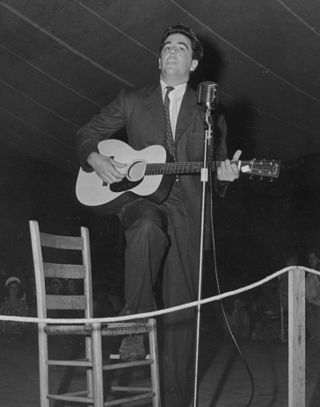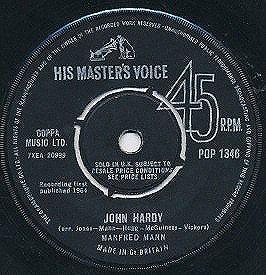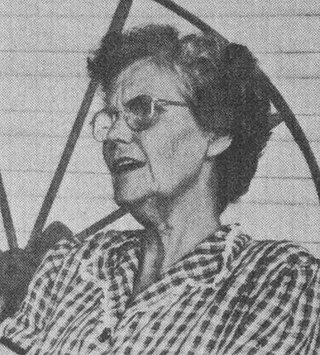Related Research Articles
Country blues is one of the earliest forms of blues music. The mainly solo vocal with acoustic fingerstyle guitar accompaniment developed in the rural Southern United States in the early 20th century. It stands in contrast primarily to the Urban blues style, especially in the pre-war era.

Alan Lomax was an American ethnomusicologist, best known for his numerous field recordings of folk music of the 20th century. He was a musician himself, as well as a folklorist, archivist, writer, scholar, political activist, oral historian, and film-maker. Lomax produced recordings, concerts, and radio shows in the US and in England, which played an important role in preserving folk music traditions in both countries, and helped start both the American and British folk revivals of the 1940s, 1950s, and early 1960s. He collected material first with his father, folklorist and collector John Lomax, and later alone and with others, Lomax recorded thousands of songs and interviews for the Archive of American Folk Song, of which he was the director, at the Library of Congress on aluminum and acetate discs.
"Hush, Little Baby" is a traditional lullaby, thought to have been written in the Southern United States. The lyrics are from the point of view of a mother trying to appease a crying child by promising to give it a gift. Sensing the child's apprehension, the mother has planned a series of contingencies in case her gifts don't work out. The simple structure allows more verses to be added ad lib. It has a Roud number of 470.

Old-time music is a genre of North American folk music. It developed along with various North American folk dances, such as square dancing, clogging, and buck dancing. It is played on acoustic instruments, generally centering on a combination of fiddle and plucked string instruments, most often the banjo, guitar, and mandolin. The genre is considered a precursor to modern country music.
"Tom Dooley" is a traditional North Carolina folk song based on the 1866 murder of a woman named Laura Foster in Wilkes County, North Carolina by Tom Dula. One of the more famous murder ballads, a popular hit version recorded in 1958 by The Kingston Trio, which reached No. 1 in Billboard Hot 100 singles chart, and also was top 10 on the Billboard R&B chart, and appeared in the Cashbox Country Music Top 20.
Shirley Elizabeth Collins MBE is an English folk singer who was a significant contributor to the English Folk Revival of the 1960s and 1970s. She often performed and recorded with her sister Dolly, whose accompaniment on piano and portative organ created unique settings for Shirley's plain, austere singing style.

Jean Ruth Ritchie was an American folk singer, songwriter, and Appalachian dulcimer player, called by some the "Mother of Folk". In her youth she learned hundreds of folk songs in the traditional way, many of which were Appalachian variants of centuries old British and Irish songs, including dozens of Child Ballads. In adulthood, she shared these songs with wide audiences, as well as writing some of her own songs using traditional foundations.
"Banks of the Ohio", also known as "Down on the Banks of the Ohio" and "I'll Never Be Yours", is a 19th-century murder ballad, written by unknown authors. The lyrics tell of "Willie" who invites his young lover for a walk during which she rejects his marriage proposal, and once they are alone on the river bank, he murders the young woman.

"John Hardy" is a traditional American folk song based on the life of a railroad worker living in McDowell County, West Virginia in the Spring of 1893. The historical John Hardy is believed to have gotten into a drunken dispute during a craps game held near Keystone, and subsequently killed a man named Thomas Drews. Hardy was found guilty of murder in the first degree, and was hanged on January 19, 1894, with 3,000 people allegedly in attendance. Hardy is believed to have made peace with the Lord the morning before his death by being baptized in a river.

Almeda Riddle was an American folk singer. Born and raised in Cleburne County, Arkansas, she learned music from her father, a fiddler and a teacher of shape note singing. She collected and sang traditional ballads throughout her life, usually unaccompanied. Introduced to a wider public by folklorist John Quincy Wolf and musicologist Alan Lomax, Riddle recorded extensively, and claimed to be able to perform over 500 songs.
"Darlin' Cory" is a well-known American folk song about love, loss, and moonshine. It is similar in theme to "Little Maggie" and "The Gambling Man" but is not considered the same as those songs.
"Keep Your Eyes on the Prize" is a folk song that became influential during the American Civil Rights Movement of the 1950s and 1960s. It is based on the traditional song, "Gospel Plow," also known as "Hold On," "Keep Your Hand on the Plow," and various permutations thereof.
"I Know You Rider" is a traditional blues song that has been adapted by numerous artists. It has appeared in folk, country, and rock guises and is not overly identified with any particular artist.
"Take This Hammer" is a prison, logging, and railroad work song, which has the same Roud number as another song, "Nine Pound Hammer", with which it shares verses. "Swannanoa Tunnel" and "Asheville Junction" are similar. Together, this group of songs are referred to as "hammer songs" or "roll songs". Numerous bluegrass bands and singers like Scott McGill and Mississippi John Hurt also recorded commercial versions of this song, nearly all of them containing verses about the legendary railroad worker, John Henry; and even when they do not, writes folklorist Kip Lornell, "one feels his strong and valorous presence in the song".
"On the Trail of the Buffalo", also known as "The Buffalo Skinners" or "The Hills of Mexico", is a traditional American folk song in the western music genre. It tells the story of an 1873 buffalo hunt on the southern plains. According to Fannie Eckstorm, 1873 is correct, as the year that professional buffalo hunters from Dodge City first entered the northern part of the Texas panhandle. It is thought to be based on the song Canaday-I-O.
Estil Cortez Ball (1913–1978) was an American singer-songwriter, fingerstyle guitarist, and country gospel and folk musician from Rugby in Grayson County, Virginia.
"The House of the Rising Sun" is a traditional folk song, sometimes called "Rising Sun Blues". It tells of a person's life gone wrong in the city of New Orleans. Many versions also urge a sibling or parents and children to avoid the same fate. The most successful commercial version, recorded in 1964 by the British rock band The Animals, was a number one hit on the UK Singles Chart and in the US and Canada. As a traditional folk song recorded by an electric rock band, it has been described as the "first folk rock hit".
"Cumberland Gap" is an Appalachian folk song that likely dates to the latter half of the 19th century and was first recorded in 1924. The song is typically played on banjo or fiddle, and well-known versions of the song include instrumental versions as well as versions with lyrics. A version of the song appeared in the 1934 book, American Ballads and Folk Songs, by folk song collector John Lomax. Woody Guthrie recorded a version of the song at his Folkways sessions in the mid-1940s, and the song saw a resurgence in popularity with the rise of bluegrass and the American folk music revival in the 1950s. In 1957, the British musician Lonnie Donegan had a No. 1 UK hit with a skiffle version of "Cumberland Gap".
"This Train", also known as "This Train Is Bound for Glory", is a traditional American gospel song first recorded in 1922. Although its origins are unknown, the song was relatively popular during the 1920s as a religious tune, and it became a gospel hit in the late 1930s for singer-guitarist Sister Rosetta Tharpe. After switching from acoustic to electric guitar, Tharpe released a more secular version of the song in the early 1950s.
The Southern Journey is the popular name given to a field-recording trip around the Southern States of the USA by the renowned ethnomusicologist Alan Lomax. He was accompanied on the trip by his then-lover, English folk singer Shirley Collins. It resulted in the first stereo field-recordings in the Southern United States, and is perhaps most noted for the 'discovery' of 'Mississippi' Fred McDowell. The music collected on the trip has had inestimable impact on the development of popular music. Tracks recorded on the trip were sampled by Moby for his Platinum-selling album Play. It also served as the inspiration for the soundtrack to the Coen Brothers' film O Brother Where Art Thou. The Southern Journey is the subject of a fascinating autobiography by Shirley Collins entitled 'America over the Water'. It is also the subject of s 2017 feature documentary, The Ballad of Shirley Collins. Lomax' own recollections of the trip were documented in his autobiography "The Land Where Blues Began", which won the National Book Award for Nonfiction in 1993.
References
- ↑ ""Face A Frowning World: An E.C. Ball Memorial Album"". Roothogordie.wordpress.com. 31 October 2009. Retrieved 26 April 2021.
- ↑ Salsburg, Nathan (October 31, 2009). "Face a Frowning World". Root Hog or Die. Retrieved March 20, 2010.
- ↑ Freeman, Dave. "E. C. Ball & Orna: Through The Years 1937-1975". Bluegrass and Old-Time CDs. County Sales. Retrieved March 20, 2010.[ dead link ]
- ↑ Keefer, Jane (November 11, 2008). "Folk Music Performer Index - Balf to Bari". Folk Music - An Index to Recorded Resources. ibiblio . Retrieved May 28, 2009.
- ↑ Weston, Frank (March 14, 1997). "E.C. and Orna Ball". Musical Traditions Internet Magazine. Retrieved May 28, 2009.